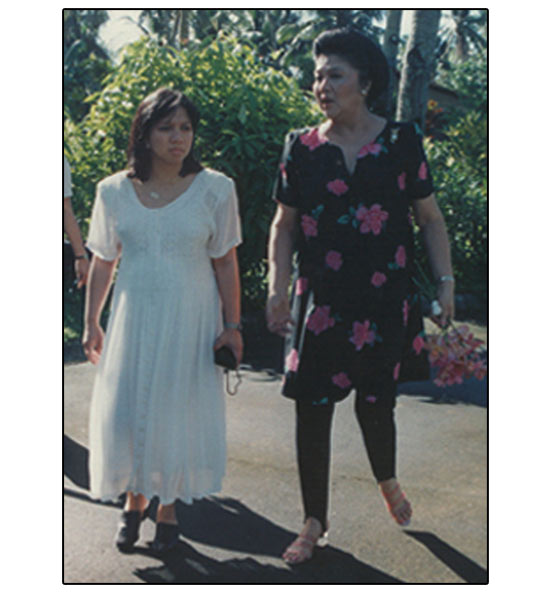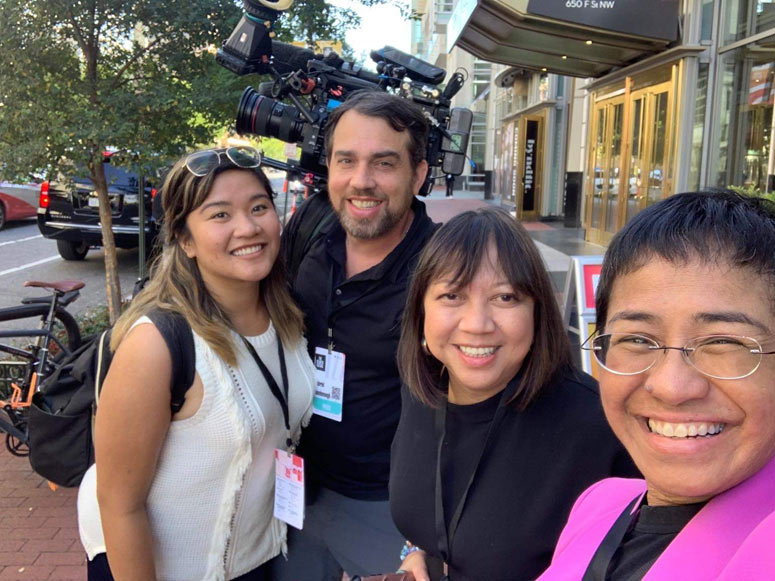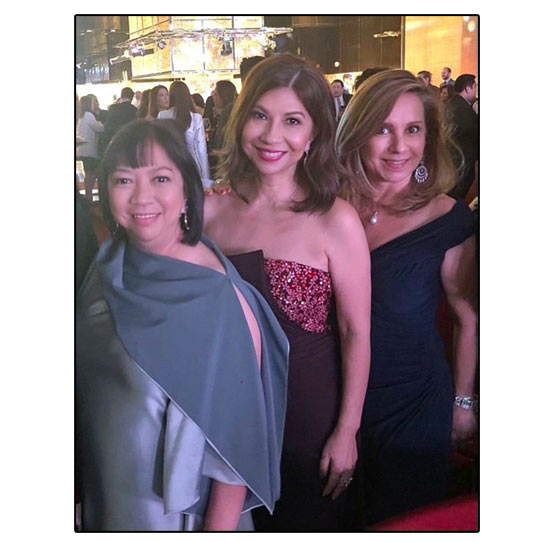RAMONA S. DIAZ
‘There is no such thing as objectivity in film’
Very few Filipinos have been under the same klieg lights as Christiane Amanpour, answering the latter’s incisive questions with confidence. Director Ramona Diaz told Christiane, who was interviewing her about her latest film, A Thousand Cuts, “I am a Filipino-American, I film a lot of Filipino stories. And basically what I do is I unlock or decode what’s happening in the Philippines to the rest of the world.”
Very few Filipinos have also been honored for their work at Robert Redford’s Sundance Film Festival, or rubbed elbows with film royalty at the Oscars.
One of them is my Assumption Convent high school classmate Ramona “Monina” Diaz.
Ramona, now a Filipino-American (and a Democrat) is an award-winning filmmaker best known for her compelling “character-driven” documentaries that are just as technically polished as they are riveting.

Ramona’s films — from one about Imelda Marcos to one featuring Filipino teachers in America and their pains — have demonstrated her “ability to gain intimate access to the people she films.”
Ramona’s Imelda, a full-length documentary about the former first lady, garnered the Excellence in Cinematography Award for documentary at the 2004 Sundance Film Festival. In Manila, it grossed more than Superman 2 during its opening weekend.
Imelda screened in over 30 film festivals around the world and was broadcast on Independent Lens in May 2005.
Her latest documentary, A Thousand Cuts, which was streamed live last week in the Philippines by Frontline, earned her a thousand second looks. As well as applause. (Philippine distributors and TV reportedly did not license the film.)
A Thousand Cuts chronicles the story of journalist Maria Ressa, who has a cyber libel conviction that could send her to prison. In January, Maria posted bail for her 10th arrest warrant.

I recently interviewed Ramona via email — the perks of being her classmate! I found out who her dream subject is — a feisty woman who is neither Imelda nor Maria. Read on.
When and why did filmmaking become your passion?
I don’t remember now when it was — it seemed like since high school when I discovered that photography and film/cinema is an organic extension of taking photographs.
What draws me to making films is — well beyond the storytelling — the capacity to transport an audience to a world they would otherwise not come in contact with and to show them the world anew. I think there’s a little bit of magic involved in that and I find that exciting.
I also hope that the audience finds themselves reflected in some fashion in the characters that populate the film. That it makes them question their own values and how they live their lives. And there is no judgment here; it’s an internal reckoning. Where in the scheme of things do you situate yourself? How as a human being do you act in the world?
What draws me to making films is the capacity to transport an audience to a world they would otherwise not come in contact with and to show them the world anew.
So, for example in the Journey film (about singer Arnel Pineda) — if you were a fish out of water, how do you comport yourself? If like in A Thousand Cuts you’re facing persecution, are you going to be as optimistic? Where will you find your silver lining?
If, like the teachers in The Learning, would you leave your infant to find a better life that will ultimately — in the long run — be better for that child?
If, like Imelda, you had so much power — how will you be? An understanding of how absolute power can be so blinding without being an apologist for the former first lady.
So in order for that to happen, there has to be something about the character that one can relate to — be they a rock star, journalist, first lady, whatever it is.
How do you choose your subjects? Do you strive to be objective or is being subjective part of your mark?
I never aspire to objectivity. Given the medium I use, film, it is impossible even if I had wanted to do it because the very nature of film resists objectivity.
There is a reason there is a director in a film — as a director, we direct your gaze, your attention, to the part of a story that we deem you should be paying attention to. We do this by means of editing, framing, the shots of the sizes, the kinds of lens we use, who we choose to be the center of the story, point of view, everything.
What you get as an audience is a mediated experience with the director as a mediator. So that in its very nature is already a subjective experience. It can never be objective. So I do not believe there is such a thing as objectivity in film.

I’m drawn to characters that have something different to say, are charismatic, are in situations that are life-altering. I usually enter a person’s life at watershed moments — Imelda returning from exile, Maria being arrested, Arnel becoming a rock star, teachers coming to America, mothers giving birth.
It’s both spectacular but also very intimate. And the camera has to love them because after all this is a film. I’m also drawn to rogues and people whose lives are messy. I think that’s also very interesting.
What are the perks and perils of doing documentaries — aside from meeting Robert Redford in his prime?
Hahaha, yes, aside from meeting “Bob,” the biggest perk is having a front-row seat to history, or to a world I would otherwise not see or be privy to.
I never aspire to objectivity. Given the medium I use, film, it is impossible even if I had wanted to do it because the very nature of film resists objectivity.
It’s both a privilege and a burden, of course. I am given so much access to the people I choose to film that I have to get it right. And I don’t mean to get it right so the people I choose to film will “like” the film. No, it’s not that.
I have to deliver what I told them was my intention — a nuanced story. I have to be true to the story — and not necessarily just the story they want to tell. So I am aware that I can neither be an apologist nor make hagiography. It’s a balancing act.
How was filming A Thousand Cuts like?
Crazy. Intense. Stressful. Tiring as heck. We had two (film) units on the ground, sometimes three, we were flying all over the Philippines, sometimes with a few hours’ notice, we were following campaigns that would change last minute, AND following a journalist who was traveling abroad constantly and getting arrested and going to court on a regular basis. There was so much to keep up with.
Who is your most unforgettable subject? Why? And who, past or present, would you like to have 15 days of filming with?
That’s a tough question, that’s like asking, “Who is your favorite child?” Each film has its own life, its own trajectory, its own heartaches, its own triumphs. Really like a life. And every time it goes out there into the world and I no longer have control of it, like a child, it’s like letting go and let the chips fall where they may.
I’ve always regretted that I didn’t make a film about Miriam Defensor Santiago while she was still with us. That would have been something.
(Ramona Diaz is a graduate of Emerson College, Boston, and holds an MA in Communication from Stanford University. Ramona’s production company, CineDiaz, currently has a slate of feature documentaries and feature films at various stages of production and development.)


